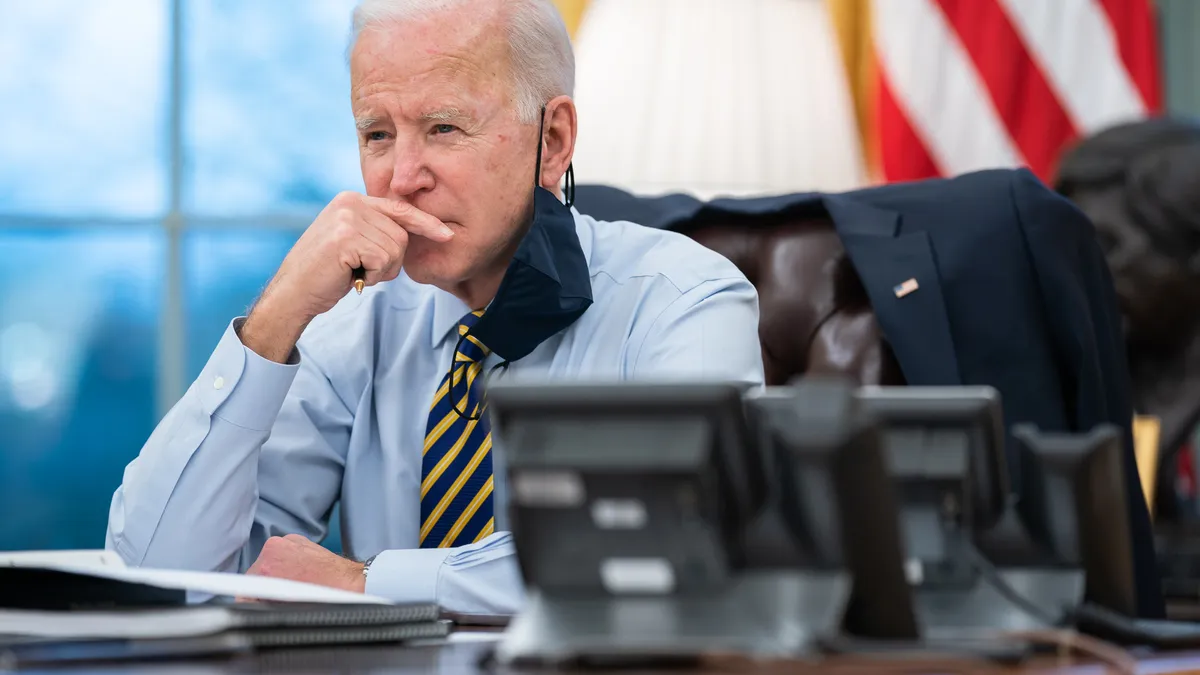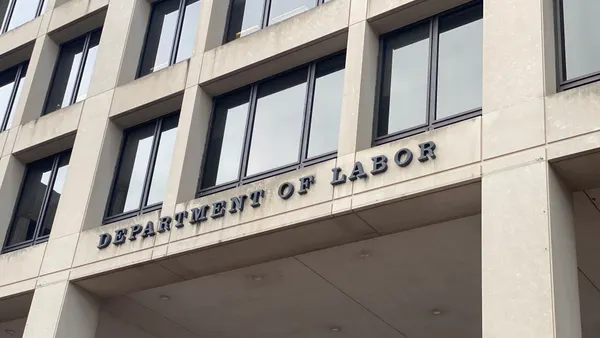Dive Brief:
- A July 9 executive order from President Joe Biden encourages the Federal Trade Commission to ban or limit the use of non-compete agreements — including those used by private companies — as well as the use of "unnecessary occupational licensing restrictions that impede economic mobility," according to a White House fact sheet published Friday.
- The provision is part of a broad directive to federal agencies that targets barriers to economic competition in a variety of industries, including healthcare, transportation and internet service, among others. The White House said actions on non-competes would make it easier for workers to change jobs while raising wages.
- Additionally, the order encourages FTC and the U.S. Department of Justice to strengthen antitrust guidance in order to "prevent employers from collaborating to suppress wages or reduce benefits by sharing wage and benefit information with one another."
Dive Insight:
The fact sheet cites research from the Economic Policy Institute, a progressive think tank, which found that nearly half of organizations in an EPI survey said that at least some of their employees were required to enter non-compete agreements. Nearly a third of respondents in the survey said all employees at their establishments were required to do so.
Although non-compete agreements have historically been associated with workers holding high-end positions, they have also been created and enforced for rank-and-file employees. A 2016 report published by the U.S. Department of the Treasury cited data showing that 15% of workers without a four-year college degree were subject to non-competes, as were 14% of workers earning less than $40,000 annually.
Most states permit some form of non-compete agreements, according to a running list maintained by Boston-based law firm Beck Reed Riden. Others have passed laws limiting the use of non-competes, including California, North Dakota, Montana and Oklahoma. Washington, D.C., signed its own restriction on non-competes in January, but the effective date for the law has not yet been determined, according to the district's Office of the Attorney General.
Non-compete agreements may still exist in jurisdictions that have passed such laws, according to the EPI report, even if those agreements would not stand up if challenged in state courts. That includes California, where the 2016 Treasury Department report found 19% of the state's employees were bound by non-competes, a rate slightly higher than the national average, it said.
Biden's order leaves some questions unanswered. It does not ban or impact any existing employment agreement, Chris Marquardt, partner at Alston & Bird, told HR Dive in an email. "Employers will need to wait and see what the FTC does in response to the Executive Order before thinking about its potential impact," he said.
Among other reasons, intellectual property and trade secrets have been cited as cause for use of non-competes. But the agreements have been the subject of criticism for potentially driving down wages in certain industries and geographic areas.
For example, a 2019 academic study of a ban on non-compete agreements for technology workers in Hawaii found that the ban increased employee mobility by 11% and increased new-hire wages by 4%. The same study found workers in states with an average level of enforceability for non-compete agreements accumulated 4.6% lower cumulative earnings and had 8% fewer jobs over a period of eight years, compared to those in a non-enforcing state.
Courts have also indicated in recent years that non-compete agreements may have some limitations in certain circumstances. For example, the 1st U.S. Circuit Court of Appeals held in a June 2020 decision that a pharmaceutical company could not enforce its 12-month non-compete agreement against an employee it laid off and later rehired.













